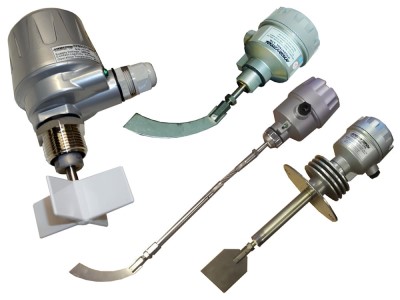
Hycontrol's RP Series of paddle switches continues to be a popular, low-price choice. The operating principle for a rotary paddle switch is straightforward. A unit consists of a motor assembly and a shaft with a paddle attached to the end of it. Typically, a paddle is mounted through the wall at the top, middle or low level of a bin. The positioning depends on the requirements of the particular application. Rotary paddle technology has been in use for many years, providing point level indication and bin level switching in many industries.
This low-cost technology is excellent for solid products such as cement, sand and plastic pellets. The Hycontrol range is available with various extension lengths and paddle shape options.
During normal operation, with no material present, a synchronous motor rotates the paddle at one revolution per minute. When an infill of material surrounds and impedes the paddle blade, the motor will stall and cause a microswitch to change state, indicating an alarm or providing a control function.
The switches have a torque-adjusting mechanism based on a spring setting. This adjustment allows the user to set the probe appropriately for light powders or denser materials. The RP Series also features a triple shaft seal to prevent the ingress of dust into the unit housing.
The rotary paddle switch remains a popular level device for many applications, and Hycontrol is pleased to offer a range of these products.
Benefits:
- High-temperature options to 200°C
- Simple installation via 1” BSP PC
- Stainless steel construction
- Adjustable insertion length
- Triple shaft seal for long motor life
- Very price competitive
- Rugged aluminium housing
- Multiple paddle designs and materials
- Adjustable sensitivity
- Two-year warranty on motor

